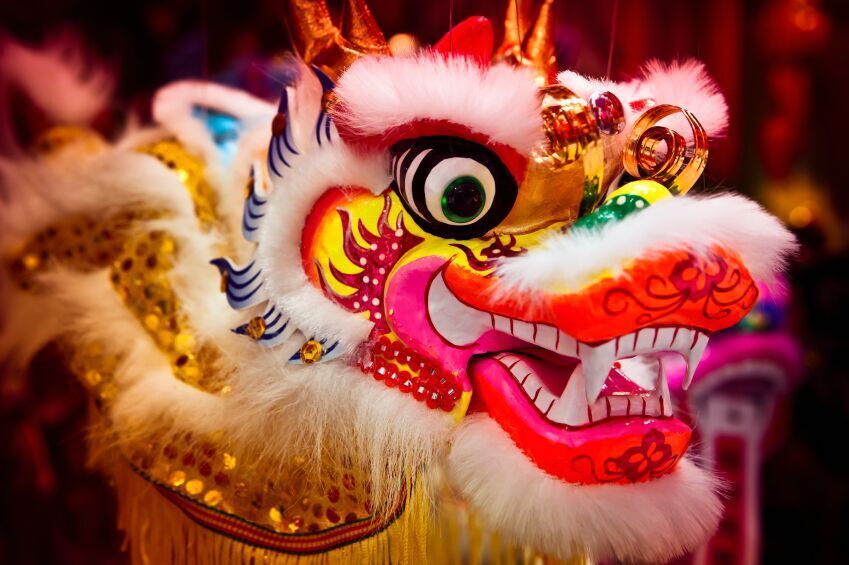Chinese communities and countries with a majority of Chinese all over the world observe the Chinese New Year. This is the time to pay homage to the gods of old, purge evil spirits and ask for the best luck.
The firecrackers go off the homes, decorated with red decorations and dumplings eat (jiaozi) by the Chinese. They believe that those who place one or two silver coins in the dumplings will gain wealth throughout the coming year.
The First Day
It is believed that the Chinese New Year is celebrated in the 2nd full moon after the Winter Solstice. It usually falls between January 21 and February 20. Based on the Chinese Calendar, the day is the start of the year new. The Chinese calendar features 12 animal-related symbols as well as names for year using the stem-branch method.

Many people spend their time decorating their homes especially windows and doors. Also, they display folk paintings, paper-cuts and couplets. A lot of households hang the red diamond-shaped fu (Chinese: Pinyin: The term “luck” and luck Chinese is spoken similar to.
Families frequently give close family members red envelopes that contain funds that represent the wealth of or honour.
Second Day
The day is about getting ready for the coming year. The houses are decorated, and cleaned. The buying of things is widespread, considering that Chinese New Year is thought to be an auspicious moment to shop for items. Hair cuts should be avoided since cutting hair can be an indication of bad luck. In a traditional meal, people eat. Most often, it’s chicken as it’s cheap and represents prosperity. Additionally, apples are consumed due to the fact that the name of their fruit is homophone of the word peace.
Money envelopes in red can be given to family members. A family photograph is captured by the oldest member of the family. This is one of the few occasions when people wear their best clothes. To get rid of bad spirit of the past year the firecrackers are set off. ufabetexpress is also a time to visit friends and relatives. In some regions, a dragon dance is held.
Third Day
The third day of Chinese new year is called Po Wu because the character for the number ten (Shi) has the same pronunciation as the word “rock.” In the legends, it was on this day Nuwa invented mankind. Families may mix seven kinds of vegetables in the soup in order to receive blessings for businesses, while some consume noodles in order to pray for long-term health. This is also the day where married girls visit their parents and others in the family, although the practice has diminished as time passes.
On this night individuals set off fireworks to scare away any bad spirits. The beginning meal of the new year includes a meal of dumplings, as well as other food items that represent wealth, prosperity, happiness and good luck. Families can also present the red envelopes stuffed with cash for children and young adults. Also, this is a day when some individuals make resolutions to save more money and to spend less.
Fourth Day
The fourth day of the Chinese new year, commonly referred to as Nian (literally “Year”) (literally “Year”) a day for family reunions. The house is cleaned and set up decor including paper-cuts for windows, folk-style paintings on walls, couplets on doors, and a large Chinese symbol for LUCK on the main entryway as well as candles in red.
Also, people pray to the God of the Kitchen God on this day, and enjoy special dishes like sugar melons (tang Gua) and sweets made from the stove (ji zio). It’s forbidden to wash hair or cut nails on the fourth day, as the two are considered negative luck.
The tenth and twelve days of the festivities don’t have as much significance like the initial five days, but they are an ideal time for more socialising and merry making of family and friends. The setting off of fireworks, visits to family members and lots of eating food are most important aspects of the celebration.
Fifth Day
On the fifth day of the Chinese new year celebrations, households will cook dumplings (Jiao zi or ji o z ) and then eat a huge celebration to mark the birth of the Kitchen God. The people also light incense as well as offer sacrifices to gods in exchange for an abundant harvest. The past was when this was a day when prohibitions and taboos from different days could be lifted.
The day is also the one where also the God of Bathrooms is believed that he visits houses and examine the hygiene of homes. It is a common practice for people to clean their bathrooms and discard items around the house. This is also the day to let go of the spirit of poverty a frail-looking man created by Nuwa. He is believed wearing ragged clothing and eat porridge that is thin. That way, you’ll be able to leave him with leftover food and candles.
Sixth Day
The sixth day commemorates the birth of humans by goddess Nu Wa. To wish for good fortune throughout the next year, certain people consume longevity noodles, and Qibao Geng. The character for number six looks like the word for doors (shi), so the day is also known in the tradition of Birthday of the Gate (Kai Nian Fan). The brides invite their husbands, children and parents to dinner for celebration.
It’s the time to break the taboos that were created during the first three days of the year including sweeping the floors and emptying the garbage bin and opening the door and window. Also, it’s the perfect time to affix spring festival with couplets, as well as Gods of Gates. Meet your loved ones and make plans to visit them. The reopening of many establishments is anticipated. Firecrackers are more commonly used along with other activities that are entertaining.
Seventh Day
This day is called the Little Year (Xiao Nian ) and people begin with preparations for Lunar New Year. On this day, people usually spend the day clearing. People also pray to the gods of the stove on the day to ensure a successful running of the stove in the year ahead.
Visit your friends and family. Exchange of gifts is popular. Gifts are valued according to the social status of those receiving and giving them. For prosperity, luck, and prosperity, several food meals are consumed. The family will also play games such as “lo hei” when they throw yusheng with chopsticks, and then shout good wishes for the new year, such as hoping for increasing prosperity. If a person gets Yaseng in the air at the highest is considered lucky.
Eighth Day
The eighth day of the Chinese New Year is known as Lantern Festival. It is a time to celebrate by throwing off fireworks to expel Nian and to bring more luck. It is also a day for family reunions. brides are able to bring their husband and children to their parents.
Many people spend their time decorating their doors and homes with paper-cuts and couplets. They display red lanterns and Chinese characters meaning LUCK upon their doorways. They also display a special dessert called the niangao.
Niangao is very popular with Chinese and Asians in areas with huge Chinese numbers, including Sydney, Australia, and San Francisco, California. Niangao consists of glutinous and wheat starch that is made of rice. It also contains sugar along with salt, water, and salt. It symbolizes wealth and longevity. The Chinese New Year dinner includes this dish.
The Ninth Day
In the past, in China in the past, a creature called Nian (Year) would roam in the streets during the week of Chinese New Year and feast on animals, crops and even people. They would use loud music like fireworks and red scrolls, to decorate their houses, scaring Nian away. Nian was scared of these decorations and also the color red, so people could safely get into their homes.
Families will enjoy special dishes like dumplings, fish and rice cakes, fruit as well as noodles that represent the abundance, prosperity, luck long-term health and wellness. They will also give children red envelopes of money to wish them good health along with luck and growth.
The Hokkiens are known as Bai Tian Gong, or praying to the Heaven God. The Hokkinos believe that our prosperity and the life we live are blessings by Heaven God. The day is also one of family reunions.
Tenth Day
In China as well as other countries that have significant Chinese communities, this holiday is celebrated as a way to spend time with loved ones. It is a joyful celebration that involves serving delicious meals, exchanging presents, and lighting up the lanterns.
It is also a time to honor ancestors and exorcise evil spirits. In this holiday, many families thoroughly clean their houses to remove bad luck from the house and welcome the good luck of the season. People also paste red couplets as well as God of Gate images on doors and windows, and buy food.
A few cities have parades that welcome the year. The case is North America this is particularly true, as cities that have an affluent Asian populace host parades. New York City, (Manhattan and Flushing), Los Angeles and Boston are some of the cities which host official parades. In 2022, California made Lunar New Year a state holiday.

